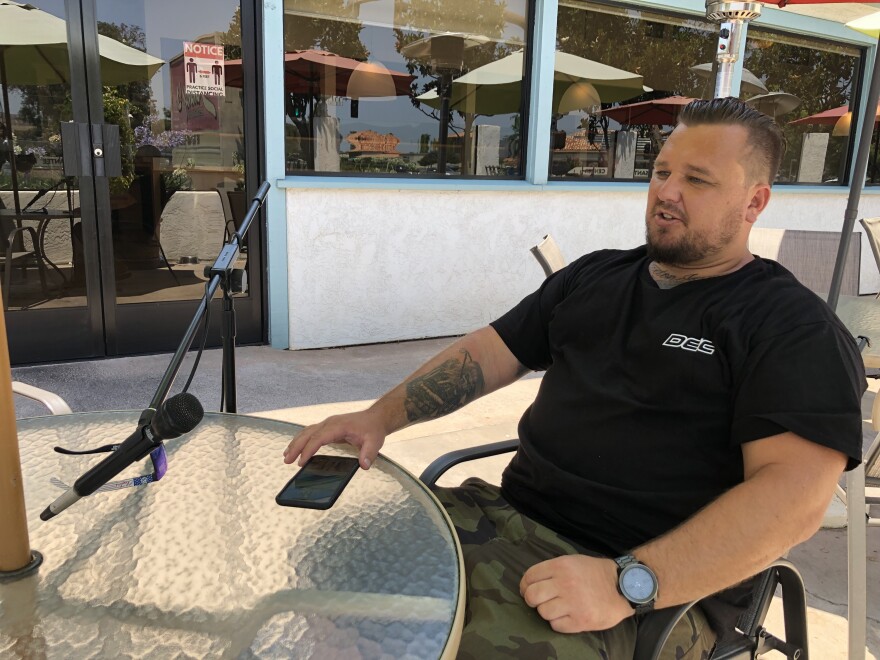Hours after live streaming from the January 6th insurrection, Defend East County (DEC) founder Justin Haskins told viewers online that it is “our constitutional duty to overthrow a tyrannical government.”
The 37-year-old construction manager, who splits his time between Santee and Yuma, Arizona, was speaking to an audience he’d been cultivating for months.
DEC started on Facebook in late May of 2020 as a response to racial justice protests that turned into a riot in downtown La Mesa, following the murder of George Floyd by Minneapolis police and the controversial arrest of a Black man by La Mesa police officer Matt Dages.
RELATED: Fired La Mesa Police Officer Seeking To Regain Job
The group’s Facebook membership quickly grew to more than 22,000. But the social media giant has removed DEC’s page multiple times due to members’ posts advocating violence against Black people. Today, Haskins estimates that its membership is somewhere between 6,000 and 8,000 “spread across multiple different groups on multiple platforms.”
In addition to being present for the Capitol insurrection, Haskins and many in DEC have adopted some of the false fringe theories of other extremist groups, many of which take their cue from the internet conspiracy phenomenon QAnon.
RELATED: What Is QAnon? The Conspiracy Theory Tiptoeing Into Trump World
He contends “there’s not a chance in hell” that President Joe Biden won the November election and that certain lawmakers in California want to make pedophilia legal. He also believes in the Pizzagate conspiracy.
“If you're asking me if I believe that there is a group of elitists in Washington, D.C. and in Hollywood that run a pedophile ring, absolutely,” Haskins said during an interview with KPBS.
Yet, in that same conversation, Haskins made it clear that he wants to be seen locally as more than a purveyor of right-wing tropes and conspiracy theories.
To that end, he downplayed his presence in Washington, D.C. on Jan. 6. He describes the event as sad, confusing and says he made way for an injured police officer to get help.
“Yes, I was at the Capitol on January 6th,” Haskins said. “No, I did not take part in it. No, I do not agree with it. And I’d rather just move on from that.”
Haskins’ moving on includes broadening the group’s reach into local politics by helping to elect his ideological kin to office.
Old strategies with a new twist
Efforts by organizations with conspiratorial and racist associations to influence politics date back centuries, most notably the Ku Klux Klan in the early 20th Century. But what’s different today is how quickly these groups can have an impact through social media, even if they are loosely organized.
Consider that both Republican candidate Darrell Issa and his Democratic rival Ammar Campa-Najjar acknowledged DEC’s political weight during last year’s 50th District congressional race, by seeking Haskins’ endorsement.
The conversations took place on Facebook live chats.
“The problem is these social media platforms like Facebook have enabled people, who would just be banging the kettle on the corner somewhere, to use the power of symbols, names and videos to create fear and anecdotes and identify villains,” said Brian Levin, director of the Center for the Study of Hate and Extremism at California State University, San Bernardino.
People emotionally connect to what they see. The ideas get magnified and then spread like a virus online, Levin said.
Haskins touts what he calls the group’s charity work and says his main purpose is to protect traditional values. But their primary target is the Black Lives Matter (BLM) movement. He calls them a “racist, terrorist organization.”
“We want legitimate due process,” Haskins said. “We don’t want to see BLM and Antifa being released without charges after burning down buildings, looting buildings.”
Local Black activist Tasha Williamson says DEC members have made racially-tinged threats against her and her son. She said while she supports BLM, DEC members falsely labeled her a leader of the movement.
“They put this out on social media and people are calling for my lynching, are calling for people to find me,” Williamson said. “At that time, I was homeless and they found out what hotel I was in.”
Video shows DEC members bullying young BLM protesters in Poway late last year while sporting knives around their waists and screaming at the teens.
And there is video of Haskins on Twitter asking a Black man “what plantation he was on.”
Haskins insists he is not a racist and claims the comments were taken out of context, but he would not provide further details. He says above all DEC is aligned with traditional conservative values.
“We want to protect freedom of speech, freedom of religion,” Haskins said. “We want to protect the Second Amendment. We want to keep the government out of our homes with the Fourth Amendment.”
Research shows that a number of groups have successfully tapped into the fear among a large cross-section of White people that they are losing their country to people of color.
A recent University of Chicago study of hundreds of people, who participated in the January 6 insurrection, showed many of them were successful, middle-aged Americans. Only a slight majority of 51% said they belonged to the Republican Party, while 34% identified as Independents and 10% Democrats.
The study also found many of the insurrectionists came from counties where the non-Hispanic white population had markedly dropped in recent decades, similar to San Diego County. And most feared they would ultimately have fewer rights than Blacks and Latinos.
“All this tells us that the insurrectionist movement is more mainstream, cross-party, and more complex than many people might like to think, which does not bode well for the 2022 mid-term elections, or for that matter, the 2024 Presidential election,” said Robert Pape, director of the Chicago Project on Security & Threats at the University of Chicago.
DEC’s agenda
Haskin said DEC has set its sights on campaigning for like-minded candidates in East County.
“Every local candidate that we supported won,” Haskins said. “Every single one.”
In addition to Congressman Issa, the group has endorsed Santee councilmembers Dustin Trotter and Laura Koval as well as Santee Mayor John Minto. Haskins said DEC also got behind Cajon Valley Union School District Trustee Jim Miller.
And Haskins mentioned his support last November for Republican Issa.
Yet, while Haskin might be trying to normalize DEC members as local conservative activists, his presence at the January 6 insurrection is significant, according to San Diego Mesa College Political Science Professor Carl Luna.
“Organizations like DEC become a gateway to funnel the ‘true believers’ into even more radical groups that could be mobilized for violence,” Luna said. “Look at the individuals who gravitated from online communities like DEC into the insurgency that stormed the capital on January 6.”
A San Diego man with past DEC affiliations was arrested by the FBI last year.
Court filings say Grey Zamudio was eager to commit acts of violence against Black people, liberals and others. A tipster contacted the FBI after seeing his social media posts commenting on the need for vigilante militias, to crush “liberal terrorists,” and stating he was “ready to die” for his beliefs.
Zamudio was recently sentenced to two years in prison on federal firearms violations which included possession of a short barrel rifle and two silencers.
Federal prosecutors argued there were no legitimate reasons for Zamudio to have the silencers, “other than to kill people.”
Zamudio texted about getting “to pull my Glock on a n*****” and smashing “on some BLM" according to court documents.
Haskins says he’s familiar with Zamudio.
“He was someone who was on the Facebook page,” Haskins said. “I met him actually the night before he got arrested. And that’s really all that I know about him.”
Haskins also acknowledges that a more radical splinter group of DEC has formed.
The offshoot group is called the “Exiled Patriots,” led by another local resident Mike Forzano. He did not respond to interview requests.
Haskins said he distanced DEC from Forzano because of the latter’s “violent, militia-type rhetoric.”
“That is literally everything I have tried to avoid and make sure that we have never gone down that path, never will go down that path,” Haskins said.
GOP establishment mum on DEC
Although Haskins has demonstrated influence in San Diego politics, no one in the local political establishment wants to talk about DEC.
KPBS contacted local GOP leaders, past and present, for their take on the group. Paula Whitsell, chairwoman of the Republican Party of San Diego County did not respond to multiple interview requests. San Diego County Supervisor Joel Anderson, who represents the eastern region, declined to talk; so did his predecessor Dianne Jacob.
Even former San Diego Mayor Jerry Sanders, who left the Republican Party after the January 6 insurrection, didn’t return calls.
And Issa, who sat shoulder-to-shoulder with Haskins during the 2020 campaign, avoids calls when the subject is DEC.
Mesa College’s Luna hypothesized that some of the silence may boil down to cold political calculus.
“It's part of a voting bloc and you need to be able to win elections,” Luna said.
But he added it’s a dangerous strategy.
You should “call out your crazies,” Luna said. “You don’t bring them into the coalition.”
Former Democratic 50th District congressional candidate Campa-Najjar said he regrets ever meeting with Haskins during the campaign.
“After learning about the violent and extreme elements that exist within this organization, I’ve decided not to give the platform any attention or legitimacy — especially after learning they were at the Capitol that day,” Campa-Najjar said.
Meanwhile, other members of San Diego’s left-leaning community are mum on DEC.
The San Diego County Democratic Party, the local NAACP chapter and the Urban League of San Diego County didn’t respond to requests for comment. Williamson speculated that they may not want to become a target of DEC harassment.
Levin called it both disappointing and disgraceful that there isn’t public condemnation of DEC by community leaders.
“We’re living in an era where the guardrails are off,” he said. “We need people of stature condemning it.”






